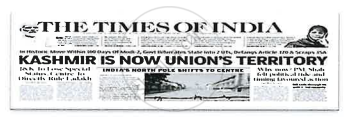Advertisements
Advertisements
Question
The Union Legislature comprises the President and the two houses of the Parliament.
With reference to the Parliament, answer the following question:
Mention any three legislative powers of the Union Parliament.
Solution
- The parliament is a law-making body and it is considered as the centre of all democratic political process. It has exclusive powers to make laws on all subjects listed in union list and concurrent list.
- The parliament can control finances by debating the budget. For example: fiscal policy.
- It serves as an arbitrary power of the executive and judicial branches of government.
- The union system of government becomes a unitary one during a national emergency by giving parliament the authority to enact laws on the 66 State List subjects. Furthermore, the parliament is consulted on all state money bills before they are approved.
APPEARS IN
RELATED QUESTIONS
What is meant by ‘Residuary Powers’ of the Parliament?
Name the two houses of the Union Parliament.
State the functions of Legislatures, Executive and Judiciary.
What are the constituents of the Parliament?
When does the President summons the Parliament in session?
What is meant by the term question hours in the context of Parliamentary procedures in India?
Mention three instances when the Parliament can make laws on the subjects entered in the State list.
The Union Legislature comprises the President and the two houses of the Parliament.
With reference to the Parliament, answer the following question:
The Parliament controls the Executive.
Mention any four ways in which it exercises its control.
The Union Parliament is the supreme legislative body in the country. With reference to the Indian Parliament answer the following question:
Mention any two powers exclusive to the Rajya Sabha.
Who made the amendment which resulted in the below headline?

